theartsdesk at the New Ross Piano Festival - Finghin Collins’ musical rainbow | reviews, news & interviews
theartsdesk at the New Ross Piano Festival - Finghin Collins’ musical rainbow
theartsdesk at the New Ross Piano Festival - Finghin Collins’ musical rainbow
From revelatory Bach played with astounding maturity by a 22 year old to four-hand jazz
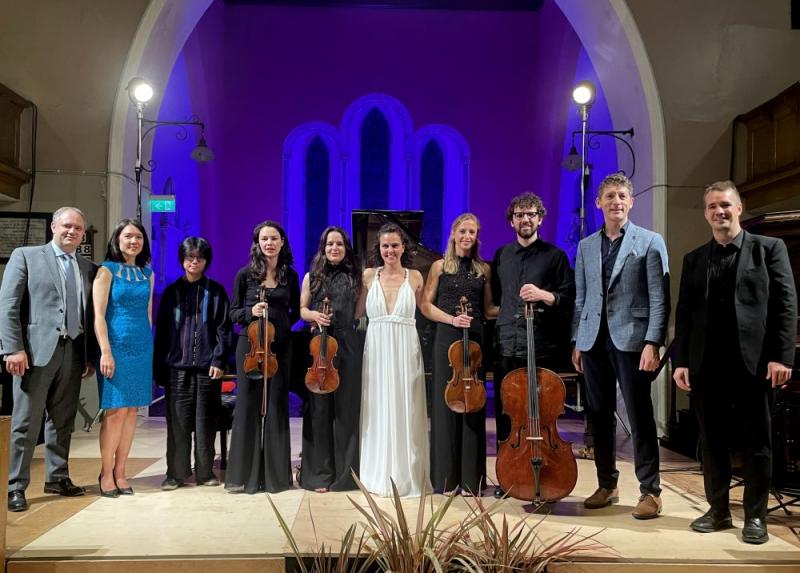
High on the hill of fascinating New Ross in County Wexford sits its greatest treasure, the ruined 13th century Gothic beauty of St Mary’s. Unless you come at it from the east, its glories are concealed behind the working church which completes it and takes the place of the old nave, built in 1813 and “improved” twice later that century.
Plain and spacious inside, with a few military memorials on the wall, the acoustics of its shoebox shape (think a smaller Musikvereinsaal without the trimmings) are perfect, as pianists great and less well-known have attested over the 19 years of the stunningly original New Ross Piano Festival. 
Others clearly had entered into the spirit, to judge from a beautifully-produced CD linked to the town's other treasure, the series of 15 large embroidered panels telling the story of New Ross's Norman origins and stitched by Irish volunteers over the past two decades.
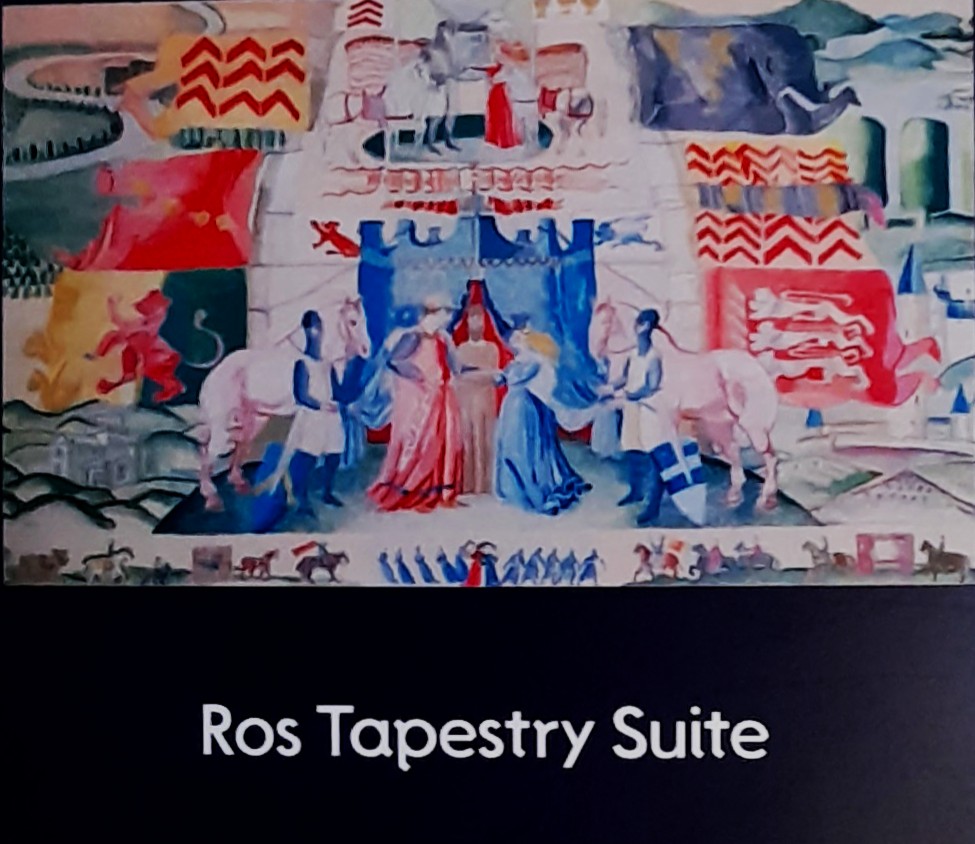 The pianists playing the 15 complementary pieces by Ireland's finest composers include Lisa de la Salle, Nicholas Angelich, Joseph Moog, Cédric Tiberghien and Collins himself (I heard him play two of them at Kilruddery, most astonishingly maverick Gerald Barry's interchange of tense silence and repeated patterns for the Wexford folk waiting for the Nomans to land).
The pianists playing the 15 complementary pieces by Ireland's finest composers include Lisa de la Salle, Nicholas Angelich, Joseph Moog, Cédric Tiberghien and Collins himself (I heard him play two of them at Kilruddery, most astonishingly maverick Gerald Barry's interchange of tense silence and repeated patterns for the Wexford folk waiting for the Nomans to land).
This year the range favoured the young, and I'm sorry I (just) missed a masterclass in which Collins' former teacher, the legendary John O'Conor, now 78, guided 12-year-old Louise Byrne (the other recipient of his wisdom was multitalented Peter Ryan, first Irish leader of the National Youth Orchestra of Great Britain, whom we'll be seeing in that capacity in the UK soon).
Collins has also been mentoring Malaysian pianist Magdalene Ho, the winner of the 2023 Clara Haskil Competition, for which he is Chairman of the Jury. Ho gave the second of the 12 noon concerts; again I'm sorry to have missed the first, in which another young pianist, Laois-born David Vesey, included his arrangements of Turlough O'Carolan alongside Liszt's Consolations. 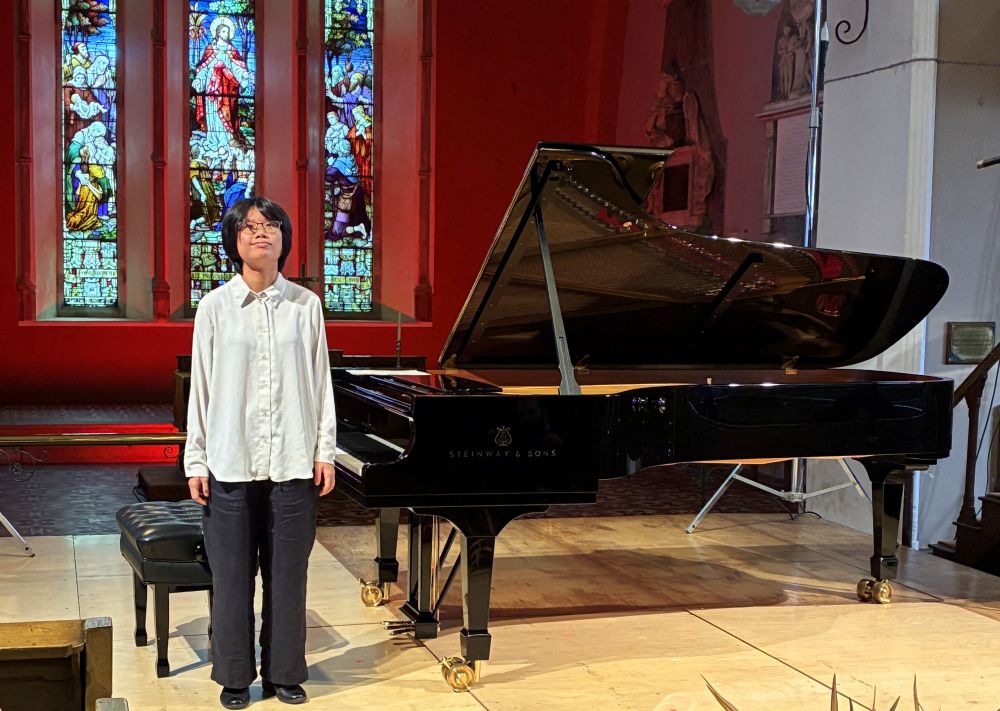 Ho worked hard on her programme with Collins, and it was one of perfect contrasts. Limpidity, rubato and clarity of counterpoint informed her perfect late-morning opening gambit, Brahms's all-too-rarely-heard Variations on an Original Theme, Op. 27 No. 1; Ades' Three Mazurkas shift from wrong-note pastiche to something deeper and more spare. They, too, were done with perfect gauging of the moods.
Ho worked hard on her programme with Collins, and it was one of perfect contrasts. Limpidity, rubato and clarity of counterpoint informed her perfect late-morning opening gambit, Brahms's all-too-rarely-heard Variations on an Original Theme, Op. 27 No. 1; Ades' Three Mazurkas shift from wrong-note pastiche to something deeper and more spare. They, too, were done with perfect gauging of the moods.
What poleaxed us, though, was the revelatory grasp of Bach's Sixth Partita in E minor, fiendishly difficult in more ways than one. I heard lines and ideas in this magisterial work I've never noticed before, starting with a superbly articulated fugue; what's more, Ho kept the flow going across the range of approaches to the dance. I can't imagine any pianist of any age bettering this.
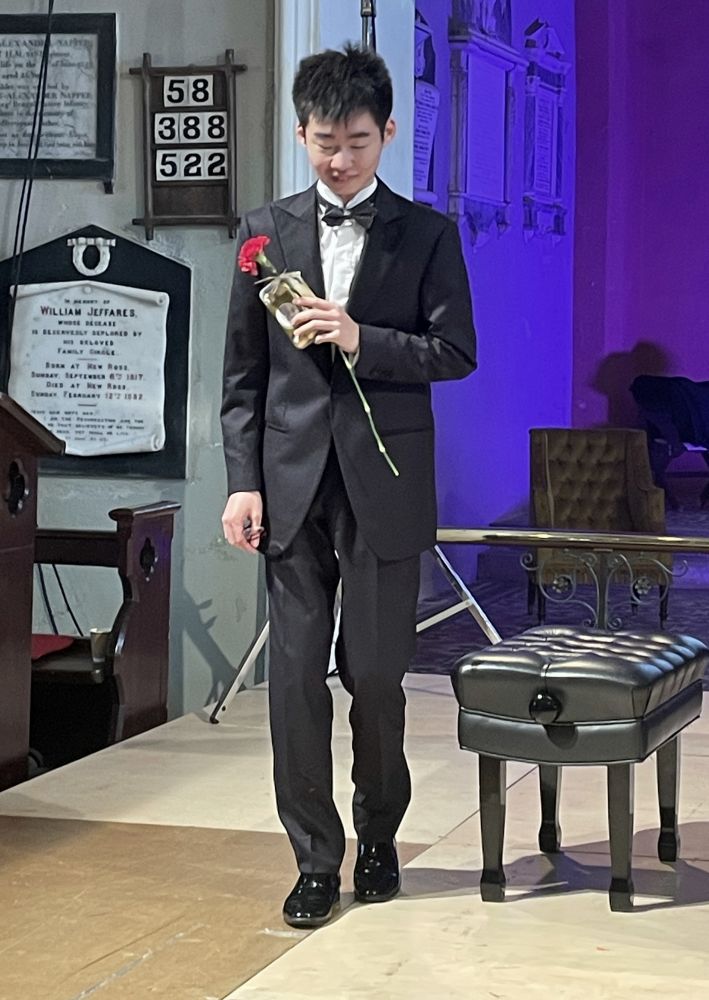 The other 12 o'clock recitalist, Shunta Morimoto (pictured left), who won the Hastings International Piano Competition and is even younger than Ho (still 20), kept his Bach lighter, as befits the eight-movement French Overture in B minor. The Chopin half of his programme showed real individuality, the tendency to slow into very inward reveries sometimes a bit too much for my taste, but as it was his, it should be honoured. As we found from personal interaction, Morimoto is shy but has a real spirit of fun; no-one was expecting him to add the Grande Valse in A flat major to the G flat major Impromptu, sparkling perfection.
The other 12 o'clock recitalist, Shunta Morimoto (pictured left), who won the Hastings International Piano Competition and is even younger than Ho (still 20), kept his Bach lighter, as befits the eight-movement French Overture in B minor. The Chopin half of his programme showed real individuality, the tendency to slow into very inward reveries sometimes a bit too much for my taste, but as it was his, it should be honoured. As we found from personal interaction, Morimoto is shy but has a real spirit of fun; no-one was expecting him to add the Grande Valse in A flat major to the G flat major Impromptu, sparkling perfection.
There was one other younger-generation pianist I hadn't encountered before, German-Greek Danae Dörken. I first heard her with the one-off reconstituted Castalian Quartet in Brahms's colossal Piano Quintet, and her range from stormy tirades and colossal romps to ideal simplicity in the lovely Andante, un poco Adagio and inward chromatic modernity in the introduction to the Finale matched theirs. Collins only learned in July that what until recently constituted the Castalian had dissolved.
So we were bereft of the brilliance of the phenomenal Sini Simonen or her fellow violinist Daniel Roberts; viola-player Natalie Loughran and cellist Steffan Morris, who had joined the quartet at a relatively late stage, were here for three performances only, and the miracle of it was that replacement violinists Abigél Králik and Mairéad Hickey made it feel as if this team had been playing together for years. The hushed passages which were such a feature of all three performances added to the amazement. 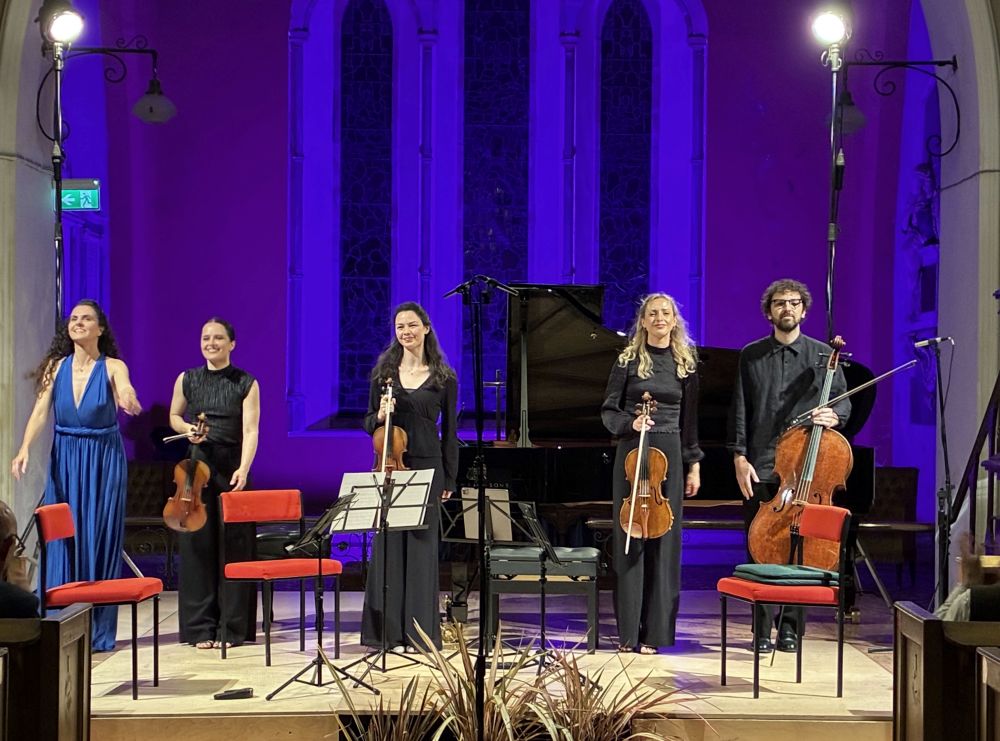 Dörken's recital the next evening was the one (half) disappointment of my time in New Ross. Her Schumann Op, 12 Fantasiestücke weren't as I knew them: the lyrical passages a touch precious, the outbursts rushed, with too much use of the sustaining pedal. Above all "Ende von Lied" ("End of the Song") didn't make sense to me. But Dörken is a true pioneer, and two of the four pieces she included from her album Odysee enriched the festival's range. Charismatic composer-pianist Fazil Say's Kara Toprak (Black Earth) broke new ground with the imitation of the Turkish saz or lute (in this case a big one) as played by the legendary composer of the ballad which inspired Say, Âşık Veysel (1891-1973) and represented hautingly by muted piano strings.
Dörken's recital the next evening was the one (half) disappointment of my time in New Ross. Her Schumann Op, 12 Fantasiestücke weren't as I knew them: the lyrical passages a touch precious, the outbursts rushed, with too much use of the sustaining pedal. Above all "Ende von Lied" ("End of the Song") didn't make sense to me. But Dörken is a true pioneer, and two of the four pieces she included from her album Odysee enriched the festival's range. Charismatic composer-pianist Fazil Say's Kara Toprak (Black Earth) broke new ground with the imitation of the Turkish saz or lute (in this case a big one) as played by the legendary composer of the ballad which inspired Say, Âşık Veysel (1891-1973) and represented hautingly by muted piano strings.
Striking, too, was Syrian Kinan Azmeh's Waiting for Friday, reaching a frenzy in its memory of the pro-democracy, anti-Assad protests of 2011. We knew we'd dropped a notch when Dörken segued into Manos Hatzidikis' relatively inconsequential Waltz of Lost Dreams. Falla's Ritual Fire Dance from El amor brujo, like the Schumann, didn't feel idiomatic. But at least we'd had two visions.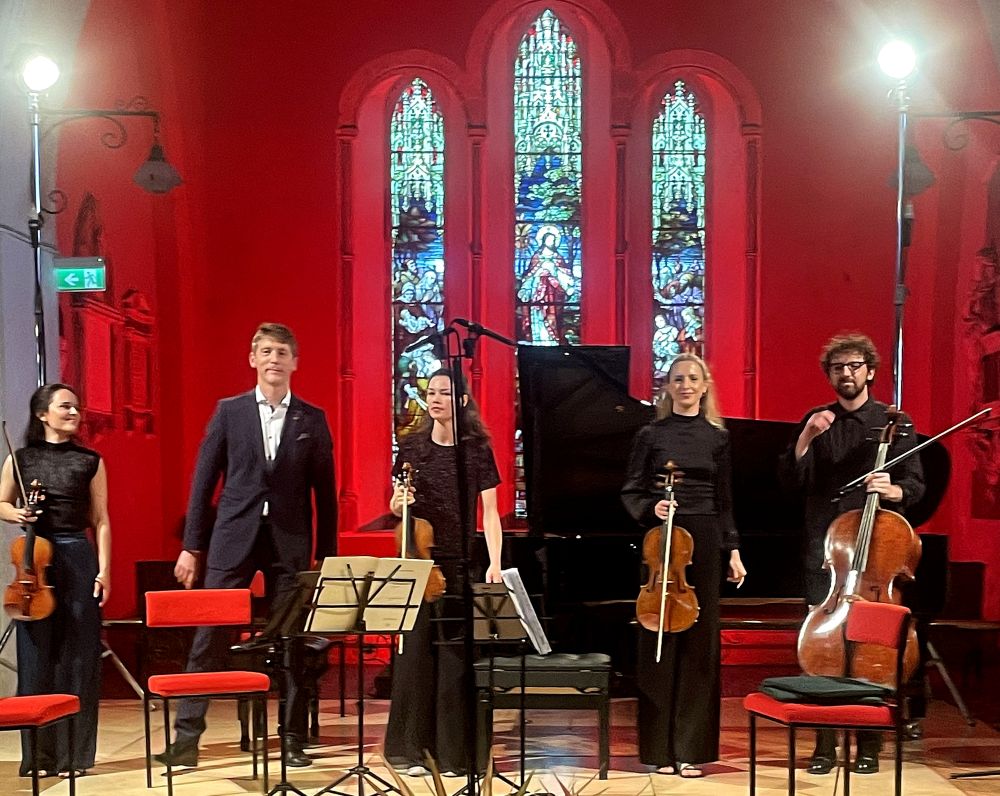 Collins began his own recital in the first of the three solo/piano quintet evenings with two evocations by Irish women commissioned by RTE lyric fm for the 2006 Dublin International Piano Competition, of which he is Artistic Director. Rhona Clarke's Tread Softly felt improvisational, nothing more, but Elaine Agnew's Seagull was variously evocative of the seascape by poet Chris Agee which inspired it. To bring the audience back to easy lucidity, Collins began the Pleyel-inspired part of his programme with the piano master's sunny E flat major Rondo and short B flat major Sonata, both shot through with memorable melodic ideas.
Collins began his own recital in the first of the three solo/piano quintet evenings with two evocations by Irish women commissioned by RTE lyric fm for the 2006 Dublin International Piano Competition, of which he is Artistic Director. Rhona Clarke's Tread Softly felt improvisational, nothing more, but Elaine Agnew's Seagull was variously evocative of the seascape by poet Chris Agee which inspired it. To bring the audience back to easy lucidity, Collins began the Pleyel-inspired part of his programme with the piano master's sunny E flat major Rondo and short B flat major Sonata, both shot through with memorable melodic ideas.
There was Chopin, of course – the B major Nocturne Op. 9 No. 3 and the very short A minor Waltz which Collins came across at the Morgan Library in New York – since the composer found Ignaz and specifically son Camille Pleyel's pianos "the last word in perfection". I was lucky to hear Roman Rabinovich play on one of Chopin's Pleyels at the Cobbe Collection in Hatchlands, Surrey; Collins' Pleyel project, now on his latest CD, came about when he played on a Pleyel 280 concert grand alongside a Steinway D at a Swiss festival.
One rather than two salon pieces apiece from miniaturists Joseph O'Kelly and Georges Pfeiffer might have been enough; but the last pairing crowned the programme: the seemingly unHaydnesque Hommage à Haydn by Debussy, proud owner of a Pleyel, and here paying homage to Pleyel's teacher, too, and an almost orgiastic climax to Debussy's L'Isle joyeuse. I witnessed Collins unexpectedly possessed at Kilruddery by Schumann's "In der Nacht" , and that was the discombobulating case here too.  If anything was going to cap that in the solo piano repertoire, it had to be two of the five symmetrically arranged Liszt pieces in Hungarian Daniel Lebhardt's selection at the last, Sunday afternoon, concerto (the start of a standing ovation at the end pictured above). Let's face it, I was dreading having to face the rodomontade of the B minor Piano Sonata yet again; but Lebhardt is a master of control in even the most excessive Liszt climaxes, and like Ho in the Bach Partita, he made sense of it: passion and precision in perfect balance.
If anything was going to cap that in the solo piano repertoire, it had to be two of the five symmetrically arranged Liszt pieces in Hungarian Daniel Lebhardt's selection at the last, Sunday afternoon, concerto (the start of a standing ovation at the end pictured above). Let's face it, I was dreading having to face the rodomontade of the B minor Piano Sonata yet again; but Lebhardt is a master of control in even the most excessive Liszt climaxes, and like Ho in the Bach Partita, he made sense of it: passion and precision in perfect balance.
Just when you thought no further well-tempered virtuosity could follow, we had a hair-raising performance of the Legend No. 2, "Saint Francis of Paola Walking on the Waves" – a turbulent but ultimately affirmative companion-piece to "Saint Francis of Assisi Preaching to the Birds", so celestially delicate at first, somehow complementing the peace of old St Mary's and its bird-filled cemetery (St Francis would have been doing his thing around the same time as William Marshal and his wife Isabel, Countess of Pembroke, were having St Mary's constructed, as detailed on the Ros Tapestry below). I avoid all-Liszt programmes as a rule, but I'd make an exception for Lebhardt; nobody who was there on Sunday afternoon will hear better interpretations of this problematic music. 
For anyone not expecting it (I wasn't), the epilogue is astonishing: a slow and hard-won peace. Few C major final chords can feel so powerful (a Martinů resolution or two, perhaps). Coming out of this utterly concentrated world felt strange indeed, and it was as well that the final piano quintet of the festival, Dvořák's rightly celebrated and adored A major, Op. 81, left us on a high rather than not knowing what to do with ourselves. Collins' dialogues with first violinist Králik were especially affecting; again, there was more delicacy in this interpretation than I've ever heard in it before.
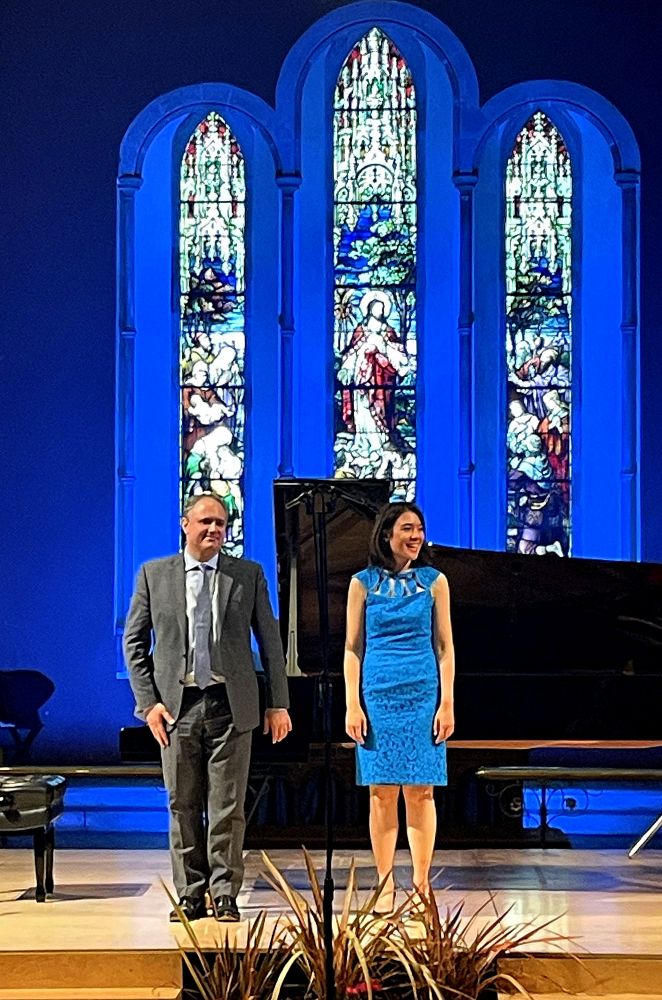 What might have been merely a jolly intermezzo on Saturday afternoon proved every inch as much a top-quality tonic as the Dvořák. I'd begun to make the acquaintance of American Stephanie Trick and Italian Paolo Alderighi in the drive from Enniscorthy, and warmed to them instantly. But what would the Duo Pianistico have to say, musically, in free-wheeling jazz variations on 11 numbers (more including medleys) from the Great American Songbook? The variety was infinitely more than I was expecting.
What might have been merely a jolly intermezzo on Saturday afternoon proved every inch as much a top-quality tonic as the Dvořák. I'd begun to make the acquaintance of American Stephanie Trick and Italian Paolo Alderighi in the drive from Enniscorthy, and warmed to them instantly. But what would the Duo Pianistico have to say, musically, in free-wheeling jazz variations on 11 numbers (more including medleys) from the Great American Songbook? The variety was infinitely more than I was expecting.
Further endearing themselves to the audience with informative, natural introductions to each piece, they had them in the palms of their hands from Harry Warren's "Jeepers Creepers" onwards. Hands would interlace, one pianist would jump aside for the other to go off on a stride solo (Trick's speciality). Embracing all styles in Kern's "Sunny" and a medley from Meet Me in St Louis (Trick's home city, incidentally), they captivated with a chromatic counterpoint-riff for "Stormy Weather" and rounded off the poignant Elsie verse from Cabaret's signature number with poetic reflections. Among the many extraordinary performers I met in New Ross, these were as addictive for future investigations as any. As for the 20th anniversary New Ross Festival in 2026, expect further arrows in Finghin's rainbow.
Watch Trick and Alderighi in "Top Hat, White Tie and Tails"
- Advance celebration of the 20th anniversary festival with Finghin Collins and Barry Douglas in Wexford Opera House on 19 April 2026
- More classical reviews on theartsdesk
Add comment
The future of Arts Journalism
You can stop theartsdesk.com closing!
We urgently need financing to survive. Our fundraising drive has thus far raised £49,000 but we need to reach £100,000 or we will be forced to close. Please contribute here: https://gofund.me/c3f6033d
And if you can forward this information to anyone who might assist, we’d be grateful.

Subscribe to theartsdesk.com
Thank you for continuing to read our work on theartsdesk.com. For unlimited access to every article in its entirety, including our archive of more than 15,000 pieces, we're asking for £5 per month or £40 per year. We feel it's a very good deal, and hope you do too.
To take a subscription now simply click here.
And if you're looking for that extra gift for a friend or family member, why not treat them to a theartsdesk.com gift subscription?
more Classical music
 From Historical to Hip-Hop, Classically Black Music Festival, Kings Place review - a cluster of impressive stars for the future
From quasi-Mozartian elegance to the gritty humour of a kitchen inspection
From Historical to Hip-Hop, Classically Black Music Festival, Kings Place review - a cluster of impressive stars for the future
From quasi-Mozartian elegance to the gritty humour of a kitchen inspection
 Shibe, LSO, Adès, Barbican review - gaudy and glorious new music alongside serene Sibelius
Adès’s passion makes persuasive case for the music he loves, both new and old
Shibe, LSO, Adès, Barbican review - gaudy and glorious new music alongside serene Sibelius
Adès’s passion makes persuasive case for the music he loves, both new and old
 Anja Mittermüller, Richard Fu, Wigmore Hall review - a glorious hall debut
The Austrian mezzo shines - at the age of 22
Anja Mittermüller, Richard Fu, Wigmore Hall review - a glorious hall debut
The Austrian mezzo shines - at the age of 22
 First Person: clarinettist Oliver Pashley on the new horizons of The Hermes Experiment's latest album
Compositions by members of this unusual quartet feature for the first time
First Person: clarinettist Oliver Pashley on the new horizons of The Hermes Experiment's latest album
Compositions by members of this unusual quartet feature for the first time
 Gesualdo Passione, Les Arts Florissants, Amala Dior Company, Barbican review - inspired collaboration excavates the music's humanity
At times it was like watching an anarchic religious procession
Gesualdo Passione, Les Arts Florissants, Amala Dior Company, Barbican review - inspired collaboration excavates the music's humanity
At times it was like watching an anarchic religious procession
 Classical CDs: Camels, concrete and cabaret
An influential American composer's 90th birthday box, plus British piano concertos and a father-and-son duo
Classical CDs: Camels, concrete and cabaret
An influential American composer's 90th birthday box, plus British piano concertos and a father-and-son duo
 Cockerham, Manchester Camerata, Sheen, Martin Harris Centre, Manchester review - re-enacting the dawn of modernism
Two UK premieres added to three miniatures from a seminal event of January 1914
Cockerham, Manchester Camerata, Sheen, Martin Harris Centre, Manchester review - re-enacting the dawn of modernism
Two UK premieres added to three miniatures from a seminal event of January 1914
 Kempf, Brno Philharmonic, Davies, Bridgewater Hall, Manchester review - European tradition meets American jazz
Bouncing Czechs enjoy their Gershwin and Brubeck alongside Janáček and Dvořák
Kempf, Brno Philharmonic, Davies, Bridgewater Hall, Manchester review - European tradition meets American jazz
Bouncing Czechs enjoy their Gershwin and Brubeck alongside Janáček and Dvořák
 Solomon, OAE, Butt, QEH review - daft Biblical whitewashing with great choruses
Even a top soprano and mezzo can’t make this Handel paean wholly convincing
Solomon, OAE, Butt, QEH review - daft Biblical whitewashing with great choruses
Even a top soprano and mezzo can’t make this Handel paean wholly convincing
 Two-Piano Gala, Kings Place review - shining constellations
London Piano Festival curators and illustrious friends entertain and enlighten
Two-Piano Gala, Kings Place review - shining constellations
London Piano Festival curators and illustrious friends entertain and enlighten
 Echo Vocal Ensemble, Latto, Union Chapel review - eclectic choral programme garlanded with dance
Beautiful singing at the heart of an imaginative and stylistically varied concert
Echo Vocal Ensemble, Latto, Union Chapel review - eclectic choral programme garlanded with dance
Beautiful singing at the heart of an imaginative and stylistically varied concert
 Scott, Irish Baroque Orchestra, Whelan, RIAM, Dublin review - towards a Mozart masterpiece
Characteristic joy and enlightenment from this team, but a valveless horn brings problems
Scott, Irish Baroque Orchestra, Whelan, RIAM, Dublin review - towards a Mozart masterpiece
Characteristic joy and enlightenment from this team, but a valveless horn brings problems

Comments
Deeply grateful for this
Deeply grateful for this thoughtful review—it's a joy to see Finghin Collins’ musical vision so beautifully recognized. The praise for his curatorial range and heartfelt performances truly captures the spirit of the New Ross Piano Festival. Here's to many more moments of artistic brilliance and shared musical discovery!